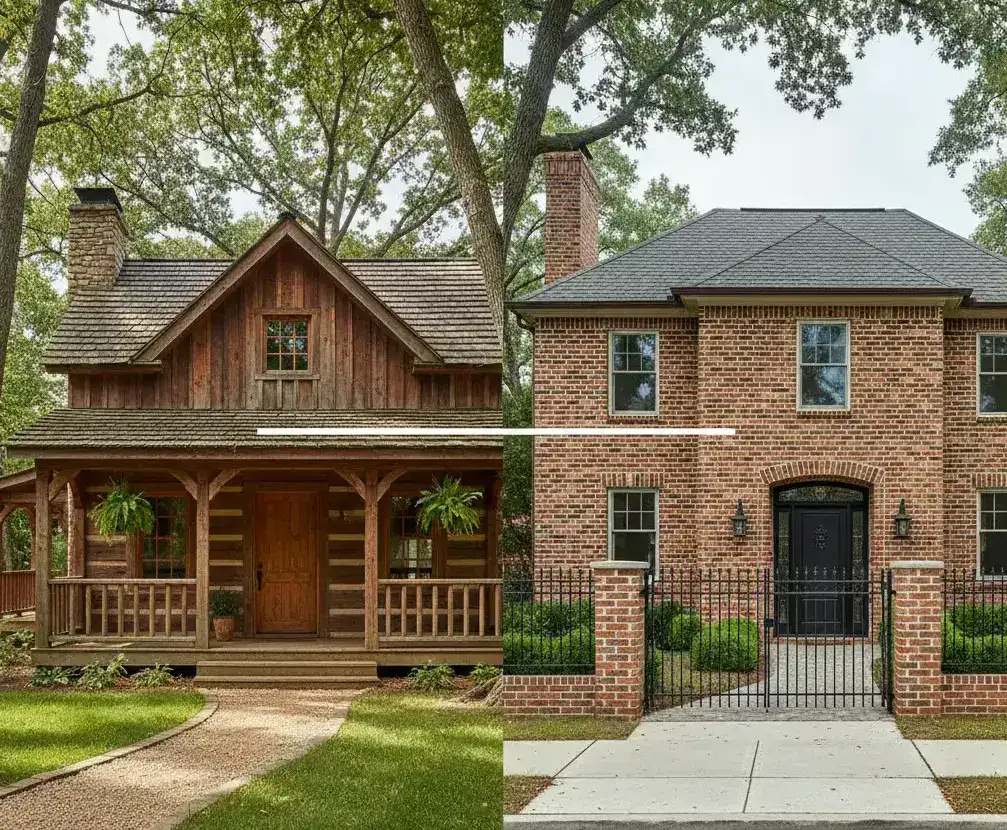This guide is prepared for seekers who want to learn about wood vs. brick houses to choose the best option. When you are stuck between the selection of these two different reliable materials. You have to dig into their distinct advantages and trade-offs. If we look into the major attributes of wood, it offers flexible design and lower cost. Mostly, seekers use it in their residential projects. However, brick is best for providing a fire-resistant feature and long-term energy efficiency. But the selection depends on your needs and the budget.
Well, both of the materials are facilitating building owners and investors to maintain safety. If you are confused about choosing between them or worried about completing the project under budget. You need to hire construction estimators from a reliable cost estimating company and save your budget and timelines.
DIG IN TO EXPLORE WOOD VS. BRICK HOUSES FROM OUR GUIDE AND CHOOSE THE MOST SUITABLE ONE FOR YOUR NEXT CONSTRUCTION PROJECT!
Wood vs. Brick Houses
Brick houses are the most durable and best for long-term value. The life expectancy of such houses is more than 500 years.
On the other hand, wooden houses are faster to construct and require less cost. You will get different design options to decorate your house with wood. However, they require more maintenance but provide excellent natural insulation properties.
Maintenance and Longevity
Brick
Brick houses require very little maintenance:
- You can say that there is no maintenance required for a brick home. This means no painting is required.
- Wooden homes must be painted every five years.
- Modern brick houses retain color for more than two decades.
- Brick typically stays durable for countless days.
Wood’s Maintenance Requirements
Wood houses demand regular upkeep:
- It requires painting every five years and wooden wall repairs, carpentry, water damage, etc.
- Wood houses can be damaged by weather, water, animals, insects, fire, and more.
- Wooden siding can last almost 20 to 40 years.
Pest and Environmental Resistance
Brick advantages:
- Brick houses do not catch termites, mould, or water damage.
- Brick wall systems reduce wood rot, insect infestations, and mold growth
Wood vulnerabilities:
- Wooden homes can catch termites, carpenter ants, and other pests.
- Wood requires regular pest control to prevent damage.
- It is less fire-resistant than brick.
Resale Value and Investment Potential
Brick’s Market Performance
Brick houses are valued more than wood houses because of their features.
- Well, a brick house will resell 6% higher than the ones that are made from other types of materials.
- If you have houses to sell. One is wood and the other is made of brick. Your brick house will sell 6-8% higher than the same size!
- If you look into the historical data, the value of a brick home increased $3,629 per year. So, this increase helps to sell the house for better profits.
- Homes with exterior bricks are more appreciated and liked by the investors. The appearance of brick provides a timeless appeal.
However, the higher resale value is due to several reasons. First, the buyer knows that the brick has a longer life, so it is durable. Second, it provides the most fascinating timeless appearance. Third, it does not require maintenance, which is the most favourite reason. Lastly, if we talk about insurance, then it requires lower insurance, which adds value to the house.
Design Flexibility and Architectural Options
Wood’s Versatility
In terms of design, wood provides flexible options. It is easy to customise the look of your house with different wood textures. You can experiment with different architectural styles from modern to sleek homes. The most favourite part about them is that they are faster to construct.
Brick’s Design Limitations and Options
On the other hand, brick offers limited options for design. But its appearance is enough for the seekers.
If you compare it with wood, brick offers much less flexibility in terms of styling. However, it is available in different sizes, and you can experiment with finishing techniques to get the desired outputs. Plus, it requires a good amount of time to work!
Sound and Comfort Factors
For this factor, both of them are beneficial. Brick is dense in nature, which is good for sound insulation. On the other hand, wood also offers a good level of humidity absorption and noise reduction. This way, the occupants get a quieter environment indoors.
If we talk about brick, then it offers a great absorption of humidity that keeps the home dry always. Plus, wood also absorbs humidity.
Factors to Consider before deciding!
Choose Wood If You:
- Have budget constraints for initial construction
- Need a faster construction timeline
- Want maximum design flexibility
- Live in earthquake-prone areas
- Prioritize environmental sustainability
- Are you comfortable with regular maintenance
Choose Brick If You:
- Can invest more upfront for long-term benefits
- Want minimal maintenance requirements
- Prioritize energy efficiency and thermal performance
- Live in fire-prone or severe weather areas
- Seek maximum resale value
- Want lower insurance costs
Conclusion
However, the choice between wood vs. brick houses is totally dependent on your budget and design taste. It is recommended that if you want a long-term savings option, then go with the brick. You may not get flexibility in the design, but it is a one-time investment opportunity. But it totally depends on what you desire. Keep in mind to thoroughly research all the factors before deciding between two of them.

